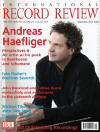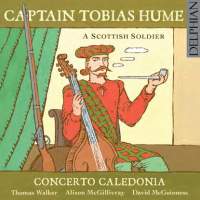Texte paru dans: / Appeared in:
*

International Record Review - (09//2014)
Pour
s'abonner / Subscription information
Delphian
DCD34140

Code-barres / Barcode : 0801918341403
This year Scotland seems to be revisiting and reassessing its history. The 700th anniversary of the Battle of Bannockburn (a significant event in the history of Scottish independence) was marked in June, and this very month a referendum on Scottish independence is taking place. So it seems appropriate that Scotland's long, if often largely overlooked, musical history is also revisited and reassessed. Glasgow‑based Concerto Caledonia does its bit towards this by celebrating the work of one of Scotland's more obscure musical characters, a man once described as 'one of the oddest composers of his time or any other'. Although the name of Tobias Hume has been known in Early Music circles for years, it was only as recently as 1991, when court accounts of the year 1606 from Anne of Denmark were unearthed, that he was confirmed as being Scottish. Up to that point his presence in London caused most authorities to believe him English while his contemporary John Dowland dismissed him as a 'stranger from beyond the sea'.
Captain Tobias Hume was a career soldier if not an out‑and‑out mercenary, fighting at various times with the armies of Denmark, Sweden, Russia and Poland. There is a suggestion in David McGuinness's fascinating booklet notes that he was among the 300
strong retinue which sailed from Leith, near Edinburgh, to Copenhagen to meet James VI's young bride (although he draws no connection between this and the nautical flavour of A Merry meeting). If one reads between the lines, Captain Hume seems also to have been one of those rather irritating figures who appear at musical gatherings, pushing himself to the fore ahead of established composers. Dowland certainly resented his presence on the London scene; although his resentment might be forgiven since Hume was forthright in his opposition to Dowland's support for the lute over the viol, and arranged some of Dowland's own lute music for the viol (A Galliard 3 shows strong connections with Dowland's own Can Shee Excuse). Dowland has thus far, however, had the last laugh, ending his days celebrated by the English musical establishment and in receipt of a stipend from the court. For his part Hume languished in a home for impoverished old soldiers, foraging for snails among the nettles, his pathetic petitions to parliament largely ignored. Then, for almost four centuries, Hume has suffered the indignity (so far as a Scot is concerned) of being labelled 'English' and ignored by the record industry.
Has his time come? If Concerto Caledonia and Delphian have anything to do with it, it has, for these are outstanding performances, full of life and vivid musical imagery, while the recording, made in a wonderful Medieval church just outside Edinburgh, combines intimacy with a great breadth of sound with astounding results. Unfortunately, for all its manifest charms and endearing idiosyncrasies, Hume's music is very much the product of enthusiasm over discipline, and while these are delightful and thoroughly enjoyable pieces, none matches Dowland's in musical quality, originality or expressive conviction. They reflect Hume's desire to court favour with all manner of nobles and wealthy patrons, and while his extensive travels are revealed in the use of French and Polish folk tunes (although McGuinness suggests these are, to quote Hume, 'Phansies expressed by my proper Genius') and through such titles as A Spanish humor and A Pollish Vilanell, the music does not explore ideas beyond the conventions of the day.
The eight musicians of Concerto Caledonia present their compatriot's music with such joy and infectious fun that, for all the music's shortcomings, this is a disc of complete and unmitigated fun. The apogee comes with the only piece in which all eight musicians appear ‑ appropriately The Souldiers Song ‑ which is an extraordinary display of exuberance, testing the vocal prowess of tenor Thomas Walker to its absolute limits. When not bawling his head off with soldierly revelry, Walker proves himself to be a remarkable vocal chameleon, oozing pathos in What greater griefe, lusty and fresh‑faced as the young lover in the jaunty Fain would I change that note (accompanied by a distinctly Gaelic‑ sounding, Renaissance flute from Chris Norman) and presenting a
politically correct huskiness to his celebration of Tobacco. Mostly, though, the music, drawn from Hume's two published sets – Captain Humes Musical] Humors of 1605 and Captain Humes Poeticall Musicke of 1607 ‑ is purely instrumental, and the exuberance, terrific abandon and sheer, unmitigated fun Concerto Caledonia brings to these invigorating dances make this a disc of unmitigated pleasure.
Cliquez l'un ou l'autre
bouton pour découvrir bien d'autres critiques de CD
Click either button for many other reviews


